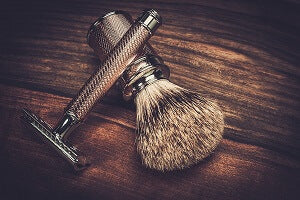Men's body-care products have chemicals linked to cancer, congenital disabilities, learning disabilities, and other chronic health problems.
- Aftershave
- shaving cream
- deodorant
- body wash
Did you know that a common chemical found in most fragrances used in personal care products could harm a man's reproductive health? The average male uses three-to-six cosmetic products every day.
Many of these personal care items contain more than 80 different chemicals. Most of these chemicals are absorbed into the skin, inhaled, or ingested. The vast majority of those cosmetic chemicals have not been assessed for your safety.
Most men don't realize that many of the toxic chemicals described below are sometimes left off product labels. This is due to loopholes in the labeling of fragrances. For example, companies can keep trade secrets such as fragrance formulas a secret and not disclose the ingredients.
One of these chemicals that may not be shown is DEP. Hazardous impurities (such as formaldehyde and 1,4-dioxane) are commonly found in men's care products.
What's in a man's medicine cabinet, and what are the problematic chemicals?
Here are the top 5 toxic chemicals to watch out for
1) Diethyl phthalate (DEP): commonly found in personal care products with fragrances such as cologne, deodorant, shaving products like aftershave and creams, plus shampoo.
- Studies have shown that DEP can cause its use to low sperm count in men. In children, Attention Deficit Hyperactivity Disorder (ADHD) and DEP can impair reproductive development in babies.
- Just one use shows that even only using fragrance or cologne one time can increase DEP levels.
- Many popular, mainstream products from manufacturers contain DEP. Quicksilver, Calvin Klein Eternity for Men, Old Spice After Hours Body Spray, and Abercrombie & Fitch Fierce, to name a few.
2) Lead acetate: can be found in hair color.
- It is banned from cosmetics in the European Union (EU) because of its toxic effects on the human reproductive system.
- Brands include Men's Grecian and Youthair.
3) Coal Tar - Neutrogena T-Gel Shampoo and other dandruff shampoos.
- They are already banned in the European Union (EU). Coal tar is a known human carcinogen found in personal products and cosmetics.
4) Triclosan: Most often found in antibacterial soaps but can also be seen in deodorants. Deodorant brands include Old Spice Wide Stick, Speed Stick, and Edge Advance. Antibacterial Handsoap from Dial.
- Hormone disruptors and can cause antibiotic-resistant bacteria.
- The Canadian Medical Association has asked its government to ban any use of triclosan in household products.
- Triclosan-containing soaps have been taken off many store shelves as there is no evidence that they perform better than just plain ole' soap and water.
5) Formaldehyde and 1,4-dioxane: Body wash and shampoos are the most frequent offenders.
- A known carcinogen is seen in animals and possibly humans.
- Formaldehyde can cause allergic reactions and rashes.
- 1,4-dioxane is known to contaminate groundwater.
Safer Alternatives for Men's Products
Yes, there are. Some companies are already making men's products that don't contain harmful chemicals, such as those listed above.
What Can You Do To Change Things?
EWG has begun the Safe Cosmetics and Personal Care Products Act of 2013 to tackle the issues that will require cosmetic companies to acknowledge all ingredients on product labels. They would like to set up a system that lets all customers know about personal care products. So consumers know what they are buying a list of all ingredients and are free of harmful components. In addition, EWG would like all care products to be tested for safety.
About the Author
Article Contributed by Danielle Winters
Organic Natural Beauty Directory Founder
Thank you to Campaign for Safe Cosmetics.org for this information.

